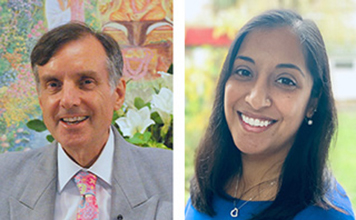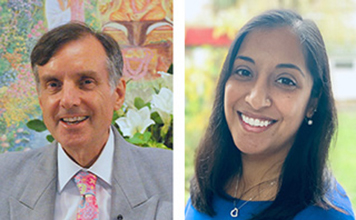Filled with knowledge of healing and herbs, Maharishi AyurVeda also has plenty to offer in terms of prevention of disease and self-help. Many of its principles can be applied in a simplified way on a daily basis and can complement any existing plan or routine.
At the end of November, the Peace Palace hosted the first of many retreats on Maharishi AyurVeda. This retreat was hosted by Dr Peter Warburton and Varsha Khatri MCMA, FNTP, a qualified nutritionist and Ayurveda consultant. The theme of the weekend was learn how to help yourself feel healthier.
The weekend was focused on equipping the participants with resources to be able to help themselves improve their health and well-being. In addition to the daily Transcendental Meditation practice, course participants had the opportunity to learn Maharishi Yoga Asanas and Pranayama, and were able to enjoy Ayurvedic meals along with group knowledge sessions.
Dr. Donn Brennan taught participants the first steps of Self-Pulse Reading. In a traditional consultation with a Vaidya (Ayurvedic doctor), the doctor will often feel the pulse to assess the functioning of the three doshas to see what is in balance and what is out of balance. Only after the pulse diagnosis and various questions and answers will the Vaidya give detailed recommendations for herbal preparations, diet, and lifestyle. Learning how to assess the doshas for yourself through the pulse can help you make choices in alignment with your needs. Self-Pulse Reading is a great tool for enhancing self-awareness as it pertains to your health and wellbeing.
Maharishi Aromatherapy is another modality that complements Maharishi AyurVeda. Liselotte Svan, an expert in Aromatherapy, led a session in which the participants learned about the various aromas and their therapeutic purposes. Some were even able to experience immediate benefits such as headaches going away by simply taking in the smell of a particular aroma.
Felicity Kaplan taught participants about the vital Marma centres of the body. A Maharishi Self-Marma Therapy session helped the participants learn about ways to balance the mind and body through an understanding of the Marmas.
The central focus on the weekend was on core Maharishi AyurVeda; thus Dr, Rajvinder Kaur taught a session on daily and seasonal routines. She explained the principles of dinacharya (daily) and ritucharya (seasonal) routines, and how applying these principles can help everyone stay healthy throughout the year, regardless of what life may bring. She also explained how the environment influences our health and taught us how to adapt accordingly.
As the co-host, Varsha Khatri shared her knowledge of diet and nutrition through the lens of Maharishi AyurVeda so that the participants could learn how to adapt their food habits in accordance with the balance of the doshas in their own individual body-type. She also expanded her talks to include how to modify an Ayurvedic diet according to the western lifestyle, as well as going through common myths and misconceptions revolving around “healthy eating”.
As a conclusion to the retreat, on the last day Dr. Rajvinder Kaur, Dr Amitha Rudraraju, and Varsha Khatri hosted a questions and answers session that dived deeper into the knowledge that had been covered over the weekend.
The weekend allowed the participants to return home with a cup full of knowledge and actionable steps enabling them to implement the recommendations and tips shared throughout the weekend by the various experts. It was an immersive experience and brought forward an introduction to the total knowledge of health through the perspective of Maharishi AyurVeda.


